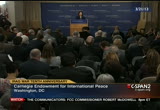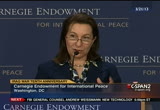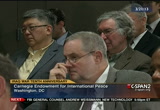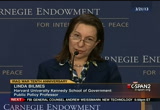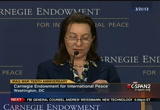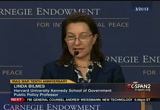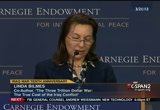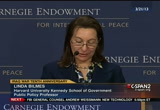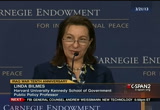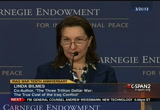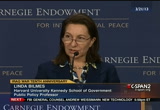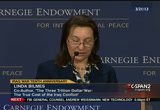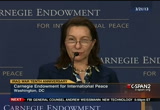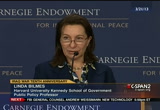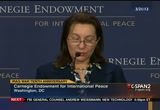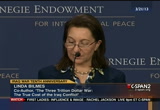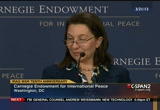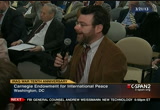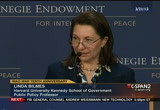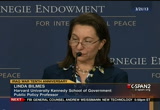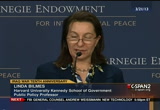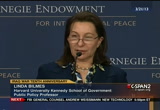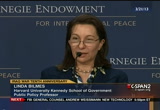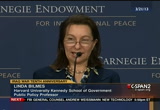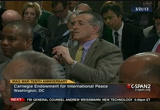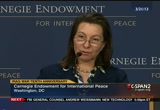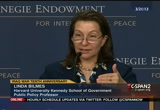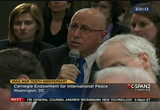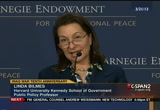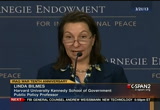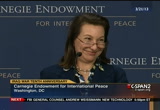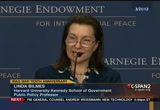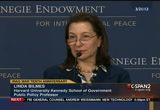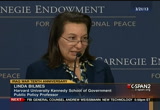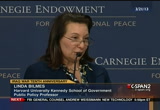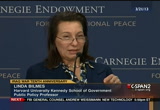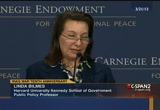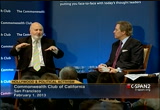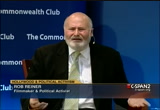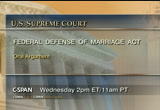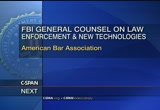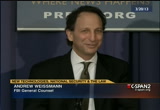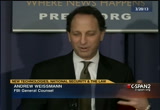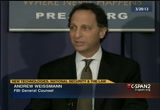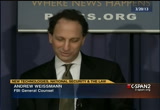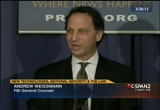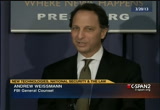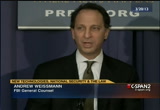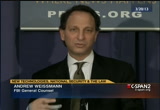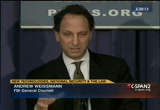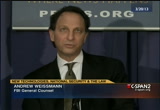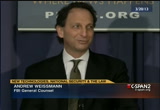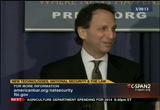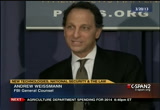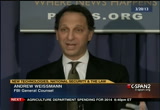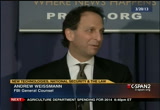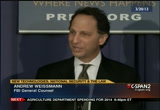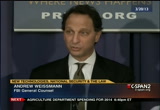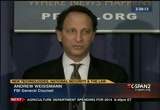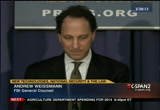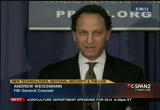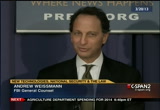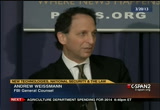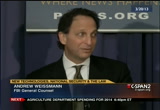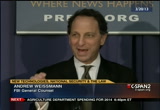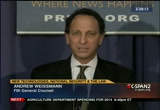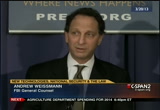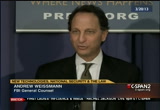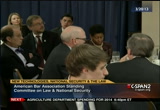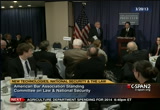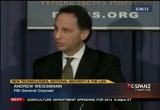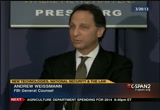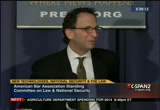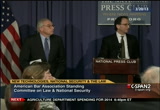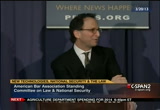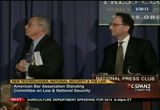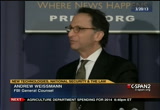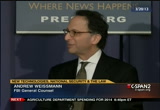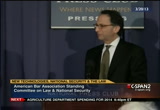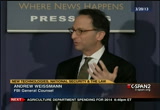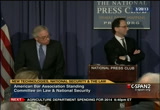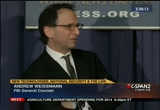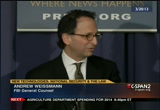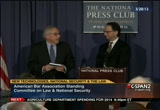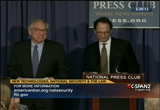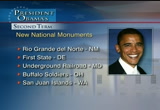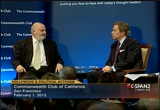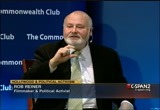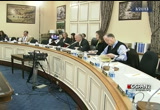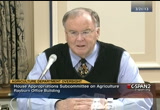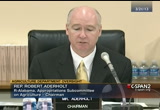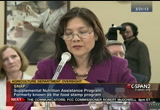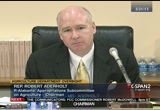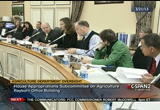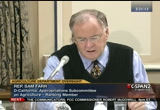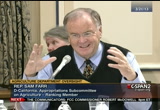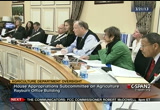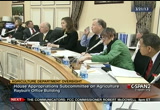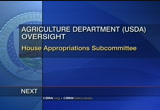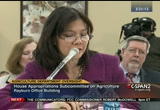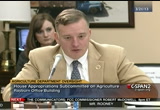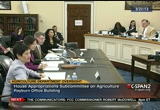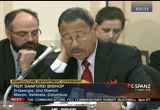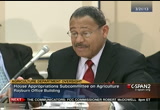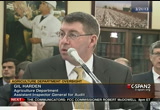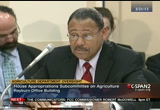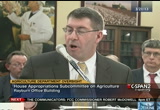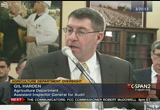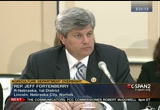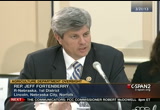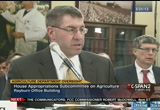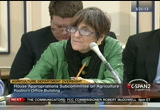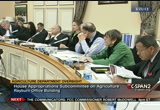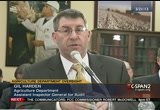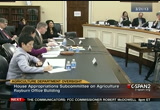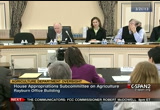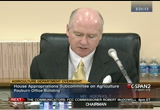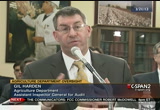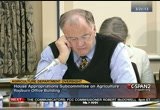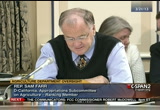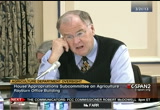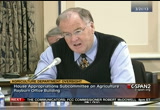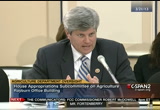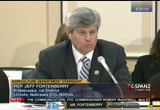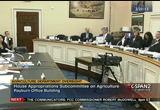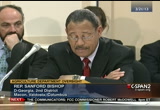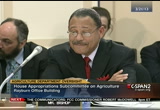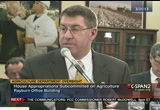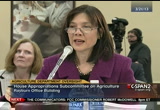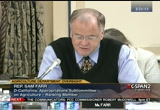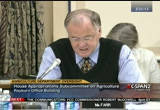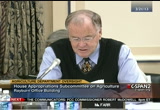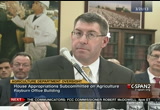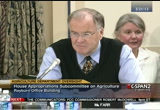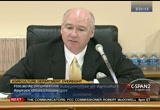tv U.S. Senate CSPAN March 25, 2013 5:00pm-8:00pm EDT
5:00 pm
to the army and marines in 2004. these include increased personnel benefits, pay indexes, health care, benefits for national guard, and retirement pay. i don't have time to go through and -- i'm happy to talk about it later, all of these, for example the tricare system which serves aced -- active duty troops serving before they are dangered to the va system or troops that don't leave active
5:01 pm
duty and their families. the tricare system is the fastest growing part of the pentagon budget. tricare spending that risen from $18 billion in 2001, to 56d billion today. this is largely the result of wartime decisions including expanding tricare to include national guard and reservists, which it didn't before because they made up 40% of the fighting force, keeping copay and enrollment fees extremely low so the price for troops and retiree is a tiny fraction of the private sector cost. during the period the cost of private sector has skyrocketed. the differ between getting health insurance in the tricare system versus in the private sector has gone from three to one to nine to one. unsurprisingly the number of people eligible for tricare who
5:02 pm
are participating in the system has risen from 22% to 59% as a result of basic economics. in addition, the sheer raw numbers of claims in the tricare system has risen extensively. for example, behavioral counseling, health counseling for troops and families, rose by 65% and counseling for the children of troops has risen by 85%. medical visits from active duty troops due to muscular skill skelton problems grew from 2009. and another interesting factor is that the companies that make up try care are some of the biggest beneficiary of the war in terms of profits. when i did some work a couple of years ago and wrote a paper on who were the main beneficiary of
5:03 pm
the war in term of profit, i expected to see blackwater and halliburton and the kind of usual suspects. in fact at the top of the list were the three companies that make up tricare who taken together would be the sixth largest contractor in the defense department. this is because they have enjoyed enormous amount of growth with all of these additional beneficiaries coming to the system. since they haven't passed on any of the costs to those beneficiaries, who still pay less than $250 a year for health care. but the government has reimbursted all the increases in the actual price of diagnostic and the actual utilization of treatment and i did diamostic higher than the private sector systems. and this tricare problem will increase even further when the
5:04 pm
affordable care act pushes everyone in to buying a medical plan, because for all of those who are not insured now, particularly guards and reservists whom at least 30% according to a recent study don't have insurance. it will be cheaper to buy to the tricare system then even to pay the penalty for not having insurance. another key decision taken in 2004, in response to the recruiting shortfall was to adopt higher pay scale indexing in the pentagon. previous pay increases were linked to the employment cost index, but in 2004, the department changed that to use the employment cost index plus 0.5%. this is added a whole another layer of cost to the dod base. for the past or two or three
5:05 pm
years congress has been having to repeal the benefits. to increase the copay for tricare, but politically it's difficult. you will understand better than me to change the benefits and so far there is no likelihood of major reforms. and finally, on this point the pentagon has a retirement system in place in which we only pay servicemembers who have served for twenty years. if you pay for -- you serve for nineteen and a half years, you don't get anything. which means in the old volunteer force, the vast majority of iraq and afghanistan troops will not qualify for pensions through the defense department. in my theory is that one of the reasons for the huge pressure on
5:06 pm
the disability system that troops get out -- i work with a large number of active duty and veteran troops. i have about twenty that work for me. they serve for several years, they serve three tours, they don't get anything but they are not quite the same. the disability comp system essentially becomes a -- that takes place of pension system. i believe there is increasing pressure for that to be reformed which will add another layer of cost. all of these are in addition to the legacy of needing to replace a generation of military equipment and vehicles which has been depressureuating six times the peacetime rate. not mention long-term commitment such as the agreement we have signed to support afghanistan for the next decade. all of this together adds
5:07 pm
another $700 billion or so to the cost of the war, it means that the u.s. will not be enjoying a peace dividend, you know, quite the contrary, the pentagon which is already facing pressure on the budget, will have a hands tied very much over the next decade dealing with coping the legacy of these costs. let me turn now to my second point. after i do a marco rubio here. [laughter] [laughter] the war has effected the economy as well, and left us with a legacy of high oil prices and higher national debt. and the iraq war -- has far reaching consequences. i have been speaking up until
5:08 pm
now about budgetary cost, of course there are vast costs to civil society both here and iraq and economic costs and financial costs. some of the costs that i'm now going talk about are costs that are born by individuals and society or society at large rather than directly by the government. the first -- there are many of these costs i can talk about. let me highlight a couple. first, if we think back to when we invaded iraq in 2003, oil prices were $25 a barrel and we had been at that level for more than two decades, and the futures market, which take in to account already increase from demand of china predicted oil prices would remain in that range for the next decade. oil prices are complicated but most experts agree that iraq was
5:09 pm
one of the triggers that lead to oil prices shooting up shortly after the innovation. oil prices peaked at $14 0 a barrel since then. since then we have seen oil prices below a level of a hundred dollars. if joe stiglitz were here he would argue that we need to connect the doubts that -- dots that the oil prices lead to the federal deserve decision to increase liquidity. it played a role in the housing bubble, which lead to the financial crisis. and he would argue that it's reasonable to attribute some of the cost of the financial crisis back to the oil price rise, which was preaccept dated in part due to the u.s. innovation of afghanistan. particularly in light of the fact that we know that oil was one of the reasons we went to war in the first place.
5:10 pm
perhaps easier to see in the context of today's budget quagmire is the fact in unprecedented move the u.s. borrowed all the money we spent in iraq. this is the first time in history since the revolutionary war, when we borrowed from france, that we cut taxes and paid for an entire war out of debt. so when we added some $2 trillion to the national credit card, which is a marriage -- major component of the debt that has been accrued in 2001. when we think about debt and deficits, there are two kinds of deficits. those are those that invest in human capital or infrastructure or invest in education and there are those who do not. which endanger our future by adding to the national debt, and
5:11 pm
this war deficit was the second kind. my third point that i am passionate about, a lot it's difficult for many people to be passionate about accounting. i'm passionate about the lack of war accounting. one of the purposes of our book, and the several book chapters that we have written since then is to argue that bad accounting matters. the u.s. owes nearly a trillion dollars in what business would call deferred compensation to the men and women who fought the war, but this liability doesn't appear anywhere on the national balance sheet. we did not account for the value of the 6,6057 lives lost in afghanistan. that's just the troops, not civilians or contractors. except for a small amount of life insurance money even though
5:12 pm
civilian government agencies estimate the value of life at $1.7 million. so epa would value each one of those lives and account for it at the cost of $7.2 million. we have accrued trillions of more dollars in debt but we don't keep track of it. in rented years, the congressional research sufficients, the gao, the pent gob, inspector general and others have repeatedly and loudly bemoaned the fact that we lack the basic accounting systems necessary to understand where the money is spent. over the past decade, the military budget has increased by one and a half trillion in addition to the money appropriated for war spending. some of that i already identified as a attributed to increases in personnel and tricare and recruiting costs. but we know that at the same time the air force and the navy have gotten smaller and older fleets than before, and the army
5:13 pm
marines, the army has grown a little bit, the marines, air force stayed the same size. if we look at where the money has gone the pentagon's accounting system is so flawed there's no way to do have an audit. and cost overreturn and war profiteering -- i have spent years trying untangle some of these commingled accounts. it shouldn't be the fact that in a city where there are thousands and thousands of economists, many my former students that take somebody sitting outside the government to track where trillions of dollars have been spent. we have also created a system in which congress can and has appropriated vast sums of money for war and yet circumvent the
5:14 pm
entire budget accountability system by calling it emergency money. we have had more than thirty emergency supplement which have funded the war, and the whole point of these emergency supplemental is they're supposed to be for actual emergencies like earthquakes and hurricanes, where the piratety is not to pay too much attention to anything except getting the money fast. so the actual requirements for the budget submission and tracking where the money goes are loose. we have spent trillions of dollars through these emergency supplement tal with minimal accountability by either side of the aisle. i want to stop soon, let me conclude by saying that one of the lessons of iraq is that by underestimating the costs and ignoring the costs and refusing
5:15 pm
to think about how we pay for the war, we made it easier for the cost to grow and to make poor choices. democracy relies on an informed citizens i are, but we have trillions of dollars that have sort of sneaked up on us without anyone really knowing how much was being spent. we have spent $2 trillion at least to date in out of pocket money, we have committed at least an additional $2 trillion to date in veteran's social security and defense spending. and we added any of the microor macro economic cot costs any impact of the thousands of people that left their jobs to become care givers would easily reach $5 trillion. if we add in afghanistan costs, which after all were precipitated by the fact we diverted 80% of troops and money
5:16 pm
5:17 pm
[laughter] >> raise your voice, please. [inaudible] >> is it working now? >> for those of us what watched the iraq war, prior, during and after if we look at it before we can point to certain decisions made before the war and certain divisions that weren't made. we can look at some of the consequences of those decisions or nondecisions later. your comment in the economic context was interesting to me because you said that because certain economic based decisions were made were not made, it bank impacted outcome later during the war. could you give an -- like a couple of good examples how the relationship was with those economic decisions? >> well, i think that the number
5:18 pm
one decision that lead to long-term consequences is there were two main decisions with regard to iraq. one was the decision tone vade iraq and the second was how to pay for it. and the decision that was taken was that we would not unlike previous wars, we would not increase taxes. we would not do anything special to pay for the war. we would put the war -- don't forget at the time we had $6 trillion in debt, we now have $16 trillion in debt. we had actually less than that. we $5.8 trillion in debt. the decision at that point in 2003, to cut taxes at the same time that we went to war was a major decision that has had long-term consequences. so much of the discussion that happens in washington now around, you know, whether it's the sequester or the budget break down or, you know, all of the stuff that the pentagon is dealing with because of the scwser and goes back to the debt
5:19 pm
has grown. and the original decision that triggered the debt and as anyone with a credit card knows it -- was the decision to immediately within the first couple of years add hundreds of billions of dollars through borrowing. i think there is a very important decision because of the fact was unprecedented. it was a decision with odds the way we paid for wars throughout history. it's hard to argue that we did what we always did was we did something actually quite different. i mean, i think so. decisions like the one i described about the pentagon about changing the way pay indexes was were decisions taken at the time for the specific reason which was the recruiting shortfall. we didn't think about the fact it would be -- maybe that was the right decision. there was no conscious decision to think about the fact if we do this we'll be making another half percent increase to pay
5:20 pm
rises forever and no way of thinking through because in the kind of, you know, rush to rush money that came in with the war about rush of the ability to get congress to proposeuate anything. we didn't think about it. we didn't think about the fact even though we knew from the previous wars that every dollar spent would cost at least another fifty cents in veterans long-term cost. we didn't give congress the choice of appropriating anything for those long-term costs. so we sort of willful -- willfully under priced the war. ron? bryan. >> thank you. bryan with the "boston globe." a couple of quick questions, one the unforseen pentagon budget cost you talked about, real
5:21 pm
quick. do you include the costs in the overall estimate of the long-term cost of the war? and then -- i guess the second question is, do you have a new estimate of that total long-term cost of iraq specifically -- i would say it's $3 trillion at one point, it sounds like you have recalibrated some of the estimates. i would assume it's higher. so the last question, if i can lob one more. briefly, what is your advice for congress, for policy makers on what to do about this? not just in the future, to take in to consideration some of the things you're talking about that were willfully ignored. is there a way they should start to plan for accounting some of the iraq war costs given it will be around for so many years? >> so, bryan. you asked a few questions. the quick answer to your first
5:22 pm
question is, we had -- when we wrote the "the three trillion dollar war" it was based on forecasting from peeves wars. what we expected the long-term cost of veterans and military personnel to be. the -- we have now been through, i mean, i have personally analyzed 600,000 veteran claims, there are 860,000 claims so, you know, i'm well on the part, as part of a team at university of california, san francisco medical school where we analyzed the medical, the social, and economic costs of each claim, and the tricare cost that i outline is part of the sort of the new and updated analysis. when we wrote "the three trillion dollar war" we came up with the number of $3 trillion no matter which way you counted it, the min -- money him you
5:23 pm
could get was to three trillion. we didn't count interest cost in that. if we had included economic costs in that amount, i mean, we could have called the book then four trillion or five trillion, in fact joe got in trouble with the publishers calling it five trillion dollar. for calling it wrong book. the minimum it could cost is four trillion. many of our costs were accurate, but the veteran's cost in particular and some of the tricare costs have grown faster than we predicted. the minimum. where the range was three to four five before -- three to five before. it's four to six. the brown cost of war study put at $6 trillion. i put at $5 trillion. at a minimum it's at least a trillion higher. secondly, in terms behalf to do about it? , i mean, i have a number of
5:24 pm
proposals. on the veterans' issue, which is where i have spent a lot of my time, the first major recommendation is that we should be appropriating money to a veteran's trust fund at the time we go war. so right now we underprice war. we underprice war the same as if we said, you know, here is a car for $20,000 but in fact it's actually there's a hayden price tag of another tag of another $25,000. nobody when say that vote in congress gets to vote on the full cost. i mean, i think we should be appropriating the -- at least an additional 25% for every dollar war spending it would have the benefit of one, making people consider more carefully the true cost of war and putting money aside for the inevitable of
5:25 pm
veteran's benefit. i think we should prohibit the use of emergency money for war spenlding. it's supposed to be resphricting to -- restricted to emergencies or new programs. after thirteen years of war, it's difficult to argue it's a unforseen expense. every year the budget caps given in the allocations to congress, you know, are set in a certain structure with a certain amount. emergency money allows do you completely bust those. it we haven't allowed the emergency supplemental mechanism to the vehicle for paying for the wars, we could have -- would have had to confront earlier how we were paying if the war. i believe the pentagon needs a top to bottom investment cost accounting and capital budgets which is basic common sense done by most cities and states and all private sector businesses larger than a corner grocery store.
5:26 pm
so they can get a grip on what former secretary gates refer to as the 30% of pentagon cost that go to overhead, and we are well aware of the fact that the sequester is a very crude method for cutting budgets. it's like what i call the cutting off your arm to lose weight method. you know, it works really well, but it creates some other problems because of the fact that, you know, dieting is really ted use and painful and takes a long time. what the pentagon needs in particular is a way of tracking through cost accounting indirect costs. so not just the cost of the final cost of the weapon, but all the cost associated with developing it and planning for it and evaluating it, and procuring it and reevaluating it
5:27 pm
and auditing it and monitoring it. the indirect cost that adds so much to the base. third or fourth, whatever i'm up to. on the va claim system. it's been on to me for a long time the system is completely broken. we spend -- we have spent by my accounting, at least $20 billion on trying to fix the bad system, you know, trying to hire people to train them to invest in the i.t. system, et. cetera it's still broken. the system is the wrong system. what we should be doing is something closer to what the irs does with taxes, which is they don't audit all the taxes. they just audit some of the taxes. you accept the taxes and they audit some that enables the system to function. and in the va, they should considering the 98% of the claims get approved in the end, we should be simply taking all
5:28 pm
the new claims, approving them to a minimum level, auditing a small subset and giving them a final resolution within five years. the medical system, blue cross blue shield processes 30 million medical claims a year. they do 99% of them within thirty days. we should be able to dot same thing. so those are some of my suggestions. yes, the gentleman in the yellow tie? that's you. and then i'll go . >> hugh -- [inaudible] i'm a veteran who is getting care at the local va, and really one of the biggest hazards sometimes the claims person who determines what kind of claim you get. -- [inaudible] i had a stroke, they didn't
5:29 pm
increase my a lotment but anyway getting back to it is something like you have in the regular community. the nonveterans and now the iraqi-afghanistan veterans are hitting the system the at the same time. but the vietnam systems are getting treatment and that is going to -- drive up the cost of the vrntion a a -- va a lot. ..
5:30 pm
the system is a graduate school application system. you have to fill in a huge amount of paperwork and send it into someone who can send you back something this is your missing this piece of paper or that piece of paper, whatever. the system should be basically a system that accepts that we cannot humanly in 57 different regional offices around the country and with 25,000, 26 year old disability claims, processes with the attrition rate of 18% a year, we can't do it. so we need a different kind of system. and what is happening at the va as you're well aware is that part of, part of the problem is the general -- general shinseki and does have tried to make others presumptive to veterans to me, to recognize the legitimacy and open access to
5:31 pm
certain claims. but the capacity of the process has not been able to accommodate that. so you have a real mismatch. and their belief is that technology is going to fix the problem, but i believe the evidence suggests that it's not. okay, the gentleman in a blue tie. >> thank you. i worked as a united nations spokesman from iraq in two years. i want you to comment so much on the trillions but on the much bigotry of hundreds of billions of dollars that was wasted under something called the. e., the project reconstruction, mainly under the pentagon in which they would start something and never goes forward, never would be completed. the iraqis never benefit. where did the money go?
5:32 pm
thank you. >> you know, one of the reasons that we wrote the book was that people had the sense that we're spending a lot, but it's sort of difficult to get you around you aren't around with a lot me speak when it comes to the reconstruction money i think it's particularly sort of hard to think about. about. so just kind of put in context, for example, in afghanistan we spent $87 billion on afghani reconstruction. most of which the pentagon has as they put it lost visibility on it. now, compare that to the national parks where we spent $2.5 billion a year to support all 400 national parks. i think if you ask most americans they would say that's a bad allocation of resources. national parks versus. in iraq, the u.s. portion of the
5:33 pm
reconstruction fund has been about $61 billion. when we look into the sort of disappearance of that money, what we find is that it goes back to this issue of accountability many of the systems when you actually go to the pentagon system contract by contract by contract, there are more than 30,000 contracts, the contracts don't require any reporting relationship for small contracts. and so you find that the reason there were so many small contractors was because there's actually no documentation required. you find a lot of the contracts that had gone into the reconstruction are classified under what's called miscellaneous foreign contracts which is a kind of black hole. you really have no idea what that money is for. the question is, if you set up a
5:34 pm
system where contracts under $100,000 don't require any documentation, contracts under $1 million are actually up to $25 million can be called miscellaneous foreign contract with minimal documentation. it's, of course there's going to be disappearance and corruption, profiteering, et cetera, et cetera. the system invites it. it will never get to the bottom of it all that money has gone, but what we can do going forward is think about what kind of accountability mechanisms we set up to allocate, award, attract and monitor money. you know, i was with general mcchrystal last weekend he was talking about the scar tissue as he puts it, created by the wars. and one of the things he would sink him he was talking of scar tissue in a number of ways, talking about scar tissue, for example, from drone attacks whether or not they kill
5:35 pm
civilians. he said every drone attacks creates a scar tissue because people think that video. as we were talking afterwards he was saying a lot of the reconstruction money had created scar tissue because it perpetuates and created this idea that we didn't care about money, throwing money at the problem, corrupt people could get their hands on money and create these kind of scar tissue. which is another sort of legacy of so much money being thrown at the war with so little accountability. the gentleman in the back. >> thank you. i don't have an affiliation. so you make a very compelling case, very sound recommendation, but things in washington don't happen without a hill and all the. so you detect any interest by the hill or congress in doing
5:36 pm
anything with respect to your recommendation? >> [inaudible] [laughter] >> you know, i would say next. we teach at the kennedy school, for example, we teach a newly elected members of congress program every two years. this year i taught, i think we had 56 newly elected members, and in addition to teaching them budgeting and event during the day, i mean, i had a whole group of them that met with him privately just to go through some of these issues. a lot of interest in reforming the veterans disability system. a lot of interest in what's going on in the tricare and pentagon health care system. a lot of interest in trying to get information. i have a lot of staffers on the hill who are contacting me and my students all the time trying to get information. i have not seen that translate
5:37 pm
into somebody who would fall on their sword, so speak, to try and lead a complete transformation in how we think about war costs, and you know i don't see anyone, unicode is sort of about to take that charge. i think a number of those who have looked at it carefully, for example, bob who was the head of the house veterans committee, who is very much embraced my reform ideas for the disability system. he left congress met andy is mayor of san diego. some of them have kind of moved on. i would say there's more hope for reform in the veterans disability area than the overall reform. [inaudible]
5:38 pm
>> you know, i would say two years ago when we had us do not this december 2 years ago when doug holtz-eakin and i were leading a discussion on the lifting of the debt ceiling, some of the republicans who were there, actually walked out of the room. this year we didn't have that. so, you know, people were more willing to listen, but i think that the extreme wing of the tea party typically does not attend the harvard new members conference this. [laughter] in my experience. >> jessica mathews. among economists, is there significant debate about your estimate, your five to $6 trillion estimate, are you
5:39 pm
still -- what are the key issues that if we were in a roomful if economists we would be tangling with you about? >> well, that's a great question. i think that, you know, the original estimate when we had the original estimate 3 trillion, came back to his sort of early on from a former student of mine who was working in the administration and he was a brilliant student, fairly senior job at omb. he called me and he said i've been tasked with setting up a committee to scrutinize all the numbers in your book, and to discredit them. i just want to let you know that. and i said, okay. fine. and he came back to the six months later and he said, okay, somebody tell you we've been through the book with a fine tooth comb. we can't discredit any of the numbers because they are all our own numbers. so what we're going to argue is
5:40 pm
that it was worth it, you know, it sort of short. in that period, came out the comments of president bush and others that we don't go to war based on green eyes shaded accountants stuff in this country. he argued was not so much around the numbers. i think the numbers, the discussion among budget people around 1.7 or 1.9, how much tricare, our money. the areas of big, the two main areas of disagreement among economists are, one, should one include the financing costs or not? should one include the cost community, if you say my house cost 500,000, you don't usually include the cost of your mortgage even though you know you will be paying 5%, whatever. the second issue is around to what extent the more indirectly
5:41 pm
contributed to the financial crisis, oil price increases and so forth. so in the oil price area what we did was oil prices went up by $100 a barrel. we've only contributed between five and $10 a barrel of that increase to the war cost which is already several hundred billion. we have certainly from discussing it with mainstream people, like dan yergin, you know, found pretty strong support for tripping some percentage of that oil price increase to the iraq war. on the issue of financing costs, our feeling is that those are direct budgetary cost if they were unprecedented costs, and that to not -- when we make such a radical departure from the way worse have been financed in the past, anyway this war finance,
5:42 pm
particularly with the combination of the fact that it was financed off the books to the emergency supplemental, that that should be on the table. now, the reason that we called it $3 trillion war, and that i'm saying a minimum of 4 trillion, is if you exclude all interest costs, and all financing costs, you get to 4 trillion already. not thinking about that. if you don't include some of the economic costs and to include some of interest cost, you can also get to 4 trillion that we don't double count. so, you know, it's not right to sort of at everything up together because there might be some double counted between economic costs and interest costs, but it is, but, you know, there's a minimum cost you achieve no matter how you get there. but the one cost of the war that i'm careful never to attribute
5:43 pm
what i think i have seen some people attribute this as a cause for is the cost of the g.i. bill. the new g.i. bill. which we see as an investment in the economy that will produce net benefit as opposed to a net cost, which is different than paying, then money we paid out to a sri lankan contractor arming we paid out to pay for a hip fracture. so that's the one area where i make that distinction. yes? are we finished? we are finished, sorry. [applause] >> u.s. secretary of state john kerry and afghan president karzai made a show of unity today. short after the u.s. military ceded control of its last detention facility in
5:44 pm
afghanistan. secretary kerry is in afghanistan for an unannounced 24 hour visit. he said he and president karzai were on the same page when it comes to peace talks with the taliban. >> coming up on c-span2, the fbi's top lawyer on how law-enforcement investigations are keeping up with new technology without breaking the law. that's followed by a house appropriations subcommittee looking into agriculture department spending. then "the communicators" with commissioner robert mcdowell. >> the nation's highest court is holding oral arguments this week on to gay marriage cases. the first people got in line thursday, and now the going rate for saving a seat is around $6000. a couple weeks ago director rob reiner explained why this is drawing such interest. here's a portion of what he had to say. >> one of the reasons we took on
5:45 pm
proposition eight, aside from the obvious reasons of marriage equality and we should all be treated as equal under the law and its, it was a bad initiative, and you know, the courts of our it overturned. we hope the supreme court will uphold those. those rulings. but it was partly an education process. we discover as we go along that, first of all, there's not one person in this audience, or anywhere, that doesn't have a gay person in the family or gay friend or gay person they work with in the workplace. nobody. nobody. so the normalizing of things, being able to teach, to being able to show people that everybody is equal, that nobody is different. if they're doing their job, it shouldn't be thought of as different. that was one of the reasons we took on prop eight, and one of the reasons we did the play eight, which was a composition
5:46 pm
of what went on inside the courtroom here in san francisco at the district trial. we put that on because we wanted to show people what action went on in that courtroom, and to normalize it. and so we find that as we move along, the wind is at our back. it is like we're hitting critical mass. you see more and more states adopting it. now great britain come you're seeing more countries. it will happen. it is supposed to happen. and i've said this many times, that we can't imagine that there was a time when women couldn't vote. we can't imagine there were times when black people couldn't vote. we can't imagine there was a time when black people couldn't marry white people. and it will be a time years now where we will say gay marriage? what was that fuss all about? it's going to take time, and we're moving in the right direction. but it is about a fundamental
5:47 pm
right, and we cannot look at our fellow citizens -- i couldn't look at chad griffin was somebody who i loved it and say, you are less than me. you deserve less than me. you are a second class citizen. you can't do that. you can't accountable about yourself that there is millions of people in this country that are not considered equal under the law. >> tomorrow, the nation's highest court hears oral arguments challenging california's proposition eight. a constitutional ban on same-sex marriage in that state. c-span and c-span radio will have live coverage beginning at 1 p.m. eastern. the arguments along with reaction will play again on c-span tomorrow night at 8 p.m. eastern. on wednesday, the court hears argument over the constitutionality of the defense of marriage act, enacted during the bush administration. c-span and c-span radio will again have coverage when the arguments are released to the public at about 2 p.m. eastern. it will be shown again wednesday
5:48 pm
night at 8 p.m. eastern on c-span. >> tonight on first ladies, called a big and as an adulterer during her husbands 1828 presidential campaign, rachel jackson dies of an apparent heart attack before andrew jackson takes office. his knees becomes the white house hostess but his later dismissed as fallout from a scandal. during the next administration, angelica van buren is the white house hostess for her father-in-law, president martin van buren, who is a winner were. we'll include your questions and comments by faux, facebook and twitter live tonight at 9 p.m. eastern on c-span and c-span3. also on c-span radio, and c-span.org. >> fbi general counsel andrew weissmann now i'm keeping up with new technologies. he spoke recently at an american bar association luncheon in washington, d.c. he talked about the challenges the fbi and other law enforcement agencies face in
5:49 pm
gaining private communications records for criminal cases. his comments are about 45 minutes. >> thank you. so, i had narrowed down the stories about, but after the introduction i think i might need to say a number of anecdotes about valerie. but actually will start with one because it's relevant to a seven through of general counsel after valerie had a position for a use. although she is small in stature, she has very large shoes to fill. and the best story i could come up with a wiki a sense of the issues is when valerie was the chief criminal division and i was a mere pup, although we did overlap, i was much younger --
5:50 pm
[laughter] i had the pleasure of defending valerie when she was a witness before chief judge weinstein, and at some point after some prodding, there was a defense question that was sort of rambling speculative and hypothetical and valerie was staring at me, fiercely. i said, objection. and the judge looked at me, what's the objection? and i said, how could the witness no? it's a hypothetical. and the judge, chief judge weinstein said i make a judicial finding that this witness knows everything. [laughter] so i would love to say that valor is a story about how i got this job was filled with hyperbole, but, unfortunately, i can't. but to the serious part of this, i'm going to talk about just
5:51 pm
briefly is the challenges posed to frankly get the general counsel's office, and its problems i think our general to other general counsel's in the intelligence community as well as the doj. and that is really three particular areas that i'm going to focus on. the jones decision from last year, going dark which i will describe to those of you don't know what that entailed, and the problems with cyber initiatives that are going on. and all those i think are examples of the challenges of new technology when we have old law. i think when i look at this and i give you my sort of frame of reference when i'm approaching these can i think of the 19th century as the industrial revolution. i think of the 20 century as modern medicine. i think of the 21st century,
5:52 pm
even though we're only 13 years into it, as the age of new technology. and the problem i see is that you have lots of 19th, 18th, 17th century borders. you have nationstates with their individual laws, and jeff crime that is transcending all of that. and so we are wrestling with how do you deal with those and am was and how do you update the log look with and you see those tensions in a variety of ways. before i turned to josh let me give the usual admonition when someone from the government speaks, which is these are my views. they are not those of the department of justice or, since i don't really think of the fbi, when this is as part of the department of justice, they are also not the views of the fbi. so let me turn to jones. just briefly for those of you who are not familiar with this major supreme court decision
5:53 pm
from last winter, the court was confronted with a case where a slap on gps kosovo properly named, was put on a car and then it collected information over a 28 day period. the court needs to decide was that a search or not under the fourth amendment? and going into that decision, many people, including myself, thought, well, what's the problem? the car is in a public space. you can see it. and you could follow it using sort of good old-fashioned gumshoe for 28 days, so why should it matter that you're using a gps, how does that transmogrify what could be done by humans which is something out improper under the fourth amendment? inspite of the great, great work of michael, the solicitor general's office who is one of those salt of the earth god
5:54 pm
sense of the department, we managed to have 10 justices rule against us here that was a laugh line. [laughter] and the first five justices in the majority used the theory, somewhat ironically, of trespass to come up with a limiting principle and found that the mere sticking on of the device on the other side of the car -- underside of the car, with the trespass with intention of seeking information. a lot of gps devices have that therefore the purpose. the irony is that the court reached back to sort of solve this 21st century problem to i think what many people thought was some what of an antiquated and outdated concept, because people really thought trespass was not synonymous with the fourth amendment violation into they said no, we didn't leave it
5:55 pm
up. we have been looking at that but only as of loss on this baseline of trespass. you can understand what the court was time to do, which was they need to come up with -- even the trespass might not be i do, it is clear. there are certain features and ways in which it's not a perfect analysis, but at least it's something that people are general counsel to give advice like, which is a clear line that you can tell people about. now, that's the first five justices. the second five justices into separate opinions, so there's no holding, had a potentially more far-reaching analysis. and that is that there is a reasonable expectation of privacy problem that is raised by the continuous monitoring of
5:56 pm
somebody for 28 days, which is too much. the court did note that maybe the results short period of time that would be okay. again if your in house counsel here, anyone here, the coursing short-term is not what you're looking for and advising a client on what to do. but essentially said, you know, it's not the case that people really expect to have full time monitoring, and the fact that you didn't have the natural drag of, devoting human resources or something, that actually does change the analysis. i liken this to the law enforcement, the place in the case of a good job of having that specter before the court of what happens when you use easy powerful devices to collect massive amounts of data and have that as sort of looming, and the
5:57 pm
court, for those five said, that should make a difference. so that sort of a nutshell of what we have to do with it as i said, the second five justices split in two decisions that there's not a holding, but obviously if you are at the fbi and other places you pay careful attention to that. so far, the courts that have dealt with applications to extend jones have not done so. so one of the things that we look at is how it is applied to non-gps and how is it being applied to gps. so one of the effects with just respected gps is the fbi has info rules, policies. and as many of you know, there are certain things, we divide of the world into assessment,
5:58 pm
preliminary investigations, and full investigations. and, of course, because it's the fbi we have acronyms for all of those. there are certain things you can do depending on the level of predication. amor predication have the more you are allowed to do more. if you need to get a warrant now under jones, you need to have a full investigation. if you don't need to get award you can do it under a preliminary investigation. so it's a very practical matter within the fbi. because we tried the latter thanks to hear to people's privacy rights. there is practical effect within the fbi and what our agents are allowed to do. on the sort of long-term effect, which is is this going to spread to other techniques, so far courts have had a number of ways to deal with it. but that has resulted in them not extending the jones decision to things such as cell sites
5:59 pm
information. and the courts have gotten around that in a number of ways. one, when is a challenge to practices that occurred pre-jones, there's the easiest way is just to rely on good faith. people were relying on the law at the time. and others is to say these are concurrences. so that the technical holding. and the third is to just differentiate those types of non-gps technologies from what was at issue in jones, and i think that's the one where i think as we go forward and as technology advances, we may have the most challenges. so cell sites information, we know what it is now. we know it is not as precise as gps in terms of tracking people on a sort of 24/7, 28 days like jones. but it may get there. ..
6:00 pm
6:01 pm
[laughter] and that department go like i thought it would. how many of you -- [laughter] how much of you in 1994 had a landline? i would assume that everyone can raise their hand. so the advent of e-mail and cell phones and all sorts of means to communicate has really changed certainly in my lifetime, and i think a key day here is 1994, because in 1994, the basic -- i'm going generallyize, the basic legal structure as to how we can obtain access to the infrastructure of how we communicate other than, you know, in person face to face was really set, and there's been very little movement it's not evolved since 1994. so in 1994, the simple thing was if you needed to the phone you
6:02 pm
went to the article iii judge, you had to meet the gold standard of probably cause to show there are care -- dirty communication on the line. the judge give you authorization to a wiretap. you went to the phone company, they gave you technical assistance, they gave you the room, where you attach the al gaiter clips and you were off to the race. things were like the -- everything was simple then. and the law that was in effect in 1994 was -- it said to the phone companies you actually had to have the ability to allow the government to intercept. you couldn't say we're not letting you in or we don't have the technical ability for you to attach the clips so you can hear the conversation. and it helped solve the 1994 issues such as intercepting
6:03 pm
landlines, cell phones, and then the very new fj technology of conference calling. so all of the cutting-edge things in 1994 were dealt with. the problem is where we are today. so the way we communicate is not limited to telephone companies and the sort of old fashioned picking up the phone and calling someone. to give you some examples of things that are not covered by the 1994 statute, you have, i mean, g. mail, google voice, drop box, as an announced in the front page of the "washington post" fairly recently after the certain scandal, the use of draft folders, or of course the one of valor that we use the most often is if you chat feature in scrabble. that also is the way a person of valor uses it to blow the seven
6:04 pm
letter use, i use it to say it's really unfair because i only have vowels. [laughter] so those are things that are not covered 1994 statute. the importance to us is, i think pretty clear what we don't is the ability to go to court and say we need a court order that actually requires the recipient of the order to e effectuate and intercept it. most people who are not lawyers sort of assume that's what you're getting when you be to court and meet the high standards of, you know, the high -- there is a you go the neutral and detached imagine evaluate, you show probable cause you think you are getting an order that you have to effectuate the communication. it's not what you get. you have to provide technical assistance is what you get. as i said, that's not true in
6:05 pm
other countries that had similar laws. the problem with not having it is that what we're doing is making the ability to intercept communications with a court order increasingly obsolete, the communications are being used for criminal conversation by definition, if you met the standard once you went to court, and so this huge legal apparatus that many of you know about to prevent crimes, prevent terrorist acts is becoming increasingly hampered, and becoming increasingly margin alized the more we have technology that is not covered by it. we don't have the ability to go to the court and say they have to do it. so some of the challenges and trying to fix that problem, it's a hard thing to talk about
6:06 pm
publicly. it's not unique to this problem, but if you're in law enforcement or in the intelligence community, you don't particularly like to tell the bad actors what you know and what you don't know. if you tell them what it is that you're capable of doing and what it is you're not capable of doing it makes it that much easier for people to avoid getting caught. the mere public discourse about this is kind of a losing proposition, but it makes it very difficult. as you can imagine, it's something there should be a public debate about. and the second issue that is difficult is trying to come up with the fairest and narrowly tailored means to do this. you don't want to have a system you're needlessly imposing burdens on driving industries or even butting tries. there's an story of steve jobs and the others iran venting --
6:07 pm
inventing apple in the garage and you don't want to be imposing burdens on the creativity. with the bureau has been spending quite a bit of time on and certainly has a top piratety this year -- priority this year is coming up with a proposal with the other members of the intelligence community that tries to balance all of that, but does tackle the problem of trying to modernize where we were from 1994 given how much technology has advanced. and let me just quickly turn to cyber. so all of you, i think you followed many speeches by director of the fbi, and many others. thed a vice president -- advent of cyber crime is really here to stay. it's possible to commit crimes in seconds that really would have taken, you know, years of
6:08 pm
planning do in the sort of real physical 3-d world. you can have critical infrastructure crimes, financial networking crimes, you have intellectual property crimes. and the tool is people write scripts that used to be sort of the same cracker of olden dais. let me just address some of the challenges. as i alluded to when i was talking about the problem of 21st century technique of being in a world where we have 19th or 18th century nation states and laws. one is geography, so in many times, the these crimes happen sort of everywhere and nowhere. so you don't have a bank robbery where there's a physical location, this is where it happened and certain evidence found at the crime scene and you send in the crime scene evidence squad and there it is inspect
6:09 pm
the situation where you have multiple locations, that frequently is not multiple locations in the united states, it's across the globe meaning you need to have an enormous amount of coordination of law enforcement and intelligence community across the globe. one example i wanted to give you is rule 41 of the federal rules of criminal procedure. rule 41 sort of great example of what i'm talking about nap is a rule that deals with search warrants. so for a typical search warrant, you need to go to the magistrate who is located in the place where the search is going to occur. so for most cyber cases, there's one exception, but for most cyber cases that's not possible. you don't -- you sometimes don't even know it's not a single location. it's multiple locations and sometimes you don't even know sort of where the search is
6:10 pm
occasioning because we -- occurring because we don't know the place of the computer. the one exception is that when national security became a real focus of congress the exceptions put in for national security cases. if you have a cyber case which is national security you can squeeze to that exception. it gives you a sense of this is where not people are thinking about the rule which is are built for the 3-d world in term of cyber which is not a 3-d world. there would clearly need to be an update so you're not trying to sort of fit, you know, particular problem in to ain't antiqualitied law. the other problem is retention. there are companies who have businesses that certainly -- essentially virtual yule computer. you rent out the space. the companies will have very
6:11 pm
short durations in which they keep things. it's part of their business model, so if you are in law enforcement that is an enormous challenge. in the 3-d world sort of taking back to my cays of en-- days of enron. it was relatively easy because companies had much -- as opposed so sledding the document. that itself if you shred there's a penalty. and you do have laws that say you need keep things for a certain amount of time. in the cyber realm, you can have companies that keep things for five minutes. of course, you can imagine totally legitimate reason for that. you can imagine how enticing that ability is for people who
6:12 pm
are up to no good. the evidence comes and it goes. so that's the second challenge. a third challenge is protecting people who are sort of innocent, unwitting dupes. a very typical scheme in cyber cases is that our computers at home are being -- to which infect other people. the concern is and the current law makes it necessary that we are carefully tailoring any result and anything we do in any -- search to just the bad actor and the infected malware. it is very challenging because of that need to carefully tailor that you are not invading the
6:13 pm
privacy or searching or seizing a computer of somebody who is a victim, even though they may not know they are a victim at the time. that issue of how search and seizure is going to be applying in the cyber world when all of our computers, as we are sitting here eating lunch can be, you know, me it's a metastasissing. it's something that the fbi and many others are worried about. and having an ability for the private sector to sort of have one stop shopping so they're not trying to figure out who do go to? dhs, fbi? it involves coordination with
6:14 pm
the government and of course now that i'm in washington i realize it's easier said than done. but that's something that is absolutely needed on the government's side which is to have the ability for companies to report something and know it's going to be handled effectively and communicated to the right people. there also needs to be know it's a two-way street. it's important have the dialogue. i think it's the only effective way to prevent this kind of conduct. there also may be a need for am anymorety. in other words for companies to know they are report information, but that they know what it is that we're going to do with that information and what we're not going do with that information. because you don't want companies to feel skiddish in reporting to the government.
6:15 pm
to the solution side it's important for the companies and the government to fight your out -- figure out together the antidote to the computer virus. there are people in the government who are wonderful at that. there are people in the private sector for and for a particular malware in a private sector, as in many things, can be extremely helpful in having the solution, and then the idea to share it. so that ante-dote gets to the couldn't the metaphor to the bloom extreme -- blood stream of the computer networking. it goes tout people in the private sector participating in the dialogue. if there's a solution that is worked on where weather it comes from the government or private sector it's used. with that, i'm going now take some questions. but i'm going end by saying something that i was told when i started this job, which was i was told in my particular job of general counsel, when i speak my goal is that i don't need to say
6:16 pm
anything that sounds remotely smart. i should need to say something that can't be quoted. [laughter] and the last time i spoke, i asked a friend of mine and he said you succeeded admirally. with that -- [inaudible conversations] >> if salespeople have questions -- if people have questions. let me take it back to the victim computers. they are commanding the control servers. we know hundreds of people who have the computers comprised who are reporting back that don't know they have been comprised. so you can get in and get the information. you can learn a lot. and the mandated report has shown there's a lot of intelligence you have gathered from that. i have two-related questions to that. first, the fbi does not have enough computer literate agents to look at all of that even if you can get the orders.
6:17 pm
how do you propose to the private sector experts who have already been hired. how can you use their legally use their expertise to get in to those computers and pursue them? and second, many of the computers are not in the united states. you don't need a court order, but fbi agents have been indicted in other countries for doing remote accesses of computers they didn't need a court order for. what is the solution to the international victim servers and getting access to those? [inaudible] [laughter] >> those are great questions. on the resource question, again, i've now learned that i'm in washington, if we certainly need additional resources at the fbi. [laughter]
6:18 pm
and i think that all of you should do your share in, you know, working the hill on that issue. so the issue is we actually do have at love ways we can work with and harness help from the private sector. there is nothing that prevents somebody from developing a solution. so company a. developed a patch, let's say we were to alert them to a particular malware. they can develop a patch to that can go out and information to to the world -- notification getting the patch sent out and people downloading it. there are ways to do that. there are also are exceptions under title 18 that allow it. so there's rights and property exception that allowed in
6:19 pm
certain circumstance. again, there's not a lot of case law on that. it's one of the things that gives us some room to also allow the private sector to work with us on those. and i agree that this is something that i think for certainly people in my again ration it doesn't -- generation it doesn't come intuitively. i think government needs to work sort of better at getting people who are really computer literate working within the government to be able to do that. the second part is easy, my answer to that is the fbi are the domestic side. so, you know, if you the director has done a lot of work with dhs and nsa and trying to figure out how we have one-stop shopping for the private sector. and the typical answer what would be overseas that's not going to be handled by us. that would really be
6:20 pm
traditionally an nsa issue. raj can comment and answer your question. [inaudible] geographic location federal installation of national security risks, and if so, does that -- [inaudible] [inaudible conversations] >> so that is really -- this is -- that's not really in my lane. to me, that is going to be a better question for, you know, dod or nsa to deal with. the way you phrase it, the sort of intuitive answer would be it sounds like it, but i would need to know a lot more what the
6:21 pm
circumstanceses are and why it's done. but typically that wouldn't be, you know, depends on the facts. it wouldn't typically fall to the fbi lane or certainly mine. >> this is dialynn from a small, local paper. [laughter] [inaudible] i have a couple of questions -- the issue is there. in talking about real time information -- [inaudible] what is covered by 1994 statute, i'm not going get in to what we
6:22 pm
can or cannot do with with respect to particular providers today for the reasons i stated. but i was discussing and that is a good example of something that is not covered by the 1994 statute. >> this is to let people -- [inaudible] for those that -- [inaudible] right. >> what is the followup though? [inaudible] people think the fbi may not be a total team player. it's in the interagency process. what it means, until it's out, we don't really talk about the specific of it. but i can assure you there's a lot of work going on, you know,
6:23 pm
all of you in washington the interagencies what that means, but, you know, one of the things i would say is that unlike last year, which was an election year, and thus, you know, the sort of prognosis of something actually moving through to the hill, you know, are not going to be good for any particular bill. that's behind us. so it's a huge priority for the fbi to have us move forward. [inaudible] [laughter] [inaudible] >> one of the principles behind going dark and i think 1994 now is the telephone technological neutrality the government could get access to the forms of communication. we should be able to get -- [inaudible] when it comes to stored records, the fbi hasn't been interested that much in -- [inaudible]
6:24 pm
other than a search warrant and preserving the ability owner a search warrant to get access to the data. i'm wondering how much technology ledge call -- [inaudible] being used when convenient or the personal view of how government should go about getting access and store it in real time communication. >> as you know, the issue of stored communication is currently being revisited in the department and elsewhere about what times appropriately tailored. and, you know, i have to con frees what i do -- confess what i do each and every time as i download the doj the chart 180 dais is it open or not opened? it's a quited -- it's quite a
6:25 pm
puss l. the i'm sympathetic to the people's expectations of how they keep things and, you know, is it like a letter. is it t not like a letter, is it like a computer? it's one of that is evolving. i don't know i would go far to say it's not technologically neutral. i think the law right now differentiates when whether you are keeping something or giving it to a third party. i think there's room for a healthy debate on that. i think the department is say it's ben foicial say the fbi is part of the department. it's actually i think shown sort of admiral movement on trying to analyze the issues. that's sort of my nonanswer. there is an effort to rethink
6:26 pm
whether all of the line certainly in the current statute are correct. [inaudible] how do you see what some of the issues in the horizon for law enforcement in that arena? you have a great deal of -- [inaudible] data and being significant -- [inaudible] how do you see the rise in those issues coming from your perspective? >> one of the things it's going to be one example of something that i focus on and are privacy lawyers is that with the advent of the data and when that gets adjusted is the potential for
6:27 pm
errors and misuse that could effect the innocent goes up. once you run a mere name check you can pull so much more information. making sure our criteria -- report a name check doing due diligence on that. we are -- i would say continually looking at that. so i sort of look at that from a privacy perspective in terms of how the data gets used. there are many, many other challenges from big data as to when we can adjust something and the predication level needed for it, and access control and because if you do ingest it doesn't mean you are going make it available to the fbi or outside of the fbi. there are a whole series of issues that come up with that. i think first and foremost is a
6:28 pm
privacy one. you have so much more data in that circumstance. >> another question? -- [inaudible] i want to say your past background -- [inaudible] >> retired fbi. valor and armed service -- [inaudible] [laughter] -- [inaudible] [laughter] [inaudible] going back to your comment of drone from a law enforcement perspective, it's fairly easy to see the practicality and the efficiency of the capability -- you talk about the challenges from your perspective and those -- [inaudible] to support going forward? is it another -- day in your
6:29 pm
life where you see it more significant than that given all the -- [inaudible] >> so are you -- the question specifically about drones? >> yes. technology. >> well, with drones specifically, that really is not something that is terribly prevalent in term of domestic use by the government at least the fbi. you know, at the very least, there is faa rules about that that need to be worked through. i read all the article of private use of drones to my horror, but there would be a lot of issue -- legal issues about how we would use it. i would suspect that the kind of use would be when you needed to see a particular thing in a particular crisis, if you need to have an aerial photograph. you can imagine doing it that
6:30 pm
way, although, you know, it would to be a reason why it need to be drone or helicopter to take the photograph. but it would be, you know, more isolated circumstance. i do think that going to have larger issue of technology, i think there's what jones was dealing with in the issue that face tort is going to be -- the court is going to be with us. i can tell you, my private assessment is that in ten years we will either look back at jones as really a sort of turn in the road, moving court in to the big issues wrestling with how to deal with technological advances. or it's going strike our children as the most ain't anti
6:31 pm
google earth make it possible to track all of us at any moment. people are going to look at it to see it's not expectations of privacy i have. i don't have any idea which if leave. if i ask my new nephew, i know where he's going to be. he doesn't it. i think where the decision takes us is going to be interesting, and honestly very important to law enforcement. [inaudible] i wanted to say it is true he raised the bar. i lowered the bar. it's clear -- i think for the audience here in the room watching demonstrate -- demonstration of elegance makes everyone feel comfortable.
6:32 pm
and i know many of the people sitting here -- the stuff going on at the bureau, it makes everyone feel good about the direction of the institution. i want to give you a small token of appreciation. this is our book. it's going to be a -- [inaudible] i think many of the issue you raise are brought to it. the special bit is we have a coin we have minted to represent the 50th anniversary. the message is all the tradition which is -- [inaudible] if you bring yours and they don't have one, they have to bayou bsh buy you a drink. [laughter] [applause] >> thank you very. >> it will bring to a close meeting. i want to reintegrate our website which is www.american
6:33 pm
www.americanbar.com. you are invited to join us. i hope you join me in thanking andrew for a thoughtful, interesting discussion. president obama has designated five new national monument using executive authority to protect significant sites. the sites rerio grand in new mexico first estate national monument in delaware, harriet tubman in mment -- the president signed five proclamationing designating the site under the anticity act. coming up on c-span2, a house appropriations subcommittee looks in to agricultural
6:34 pm
department spending. then ""the communicators" with a fcc commissioner robert mcdowell. and at 8:30 eastern, we begin a week of booktv prime time. tonight three books on u.s. innovation. the nation east highest court is holding oral arguments on two gay marriage cases. tickets to the two argument are technically free. the first people got in line thursday. the going rate for saving a seat is around $6 ,000. the couple of weeks ago director explained why it's drawing such interest. here's a importance of what he had -- portion of what he had to say. >> do you think that will -- are you optimistic about what the supreme court will do? >> i am. you obviously never know when a case is in front of the supreme court, but if they are going to rule and this is what they do base on the law, we have a trial
6:35 pm
here in san francisco with many weeks of evidence. we brought on seventeen witnesses, they brought on two. and one of their witnesses was their expert witness against the idea of gay marriage has done a 180. his name is david, and now said absolutely should be something that should be done. and if you lack, -- look at it from a legal standpoint, there's nothing to argue. you argue from a moral standpoint. you can say morally i don't like the idea of gay marriage because your church teaches you certain things. that's fine. we're not asking anybody, we're not forcing any church to perform ceremonies, we're not asking anybody to go outside their religious beliefs, but marriage is not a religious right. it's a civil right that is provided by the government. a church does not have a right to marry someone except that it is given the right by the government. the government issues marriage
6:36 pm
licenses. the government decidings who gets married and who doesn't. so in 1967, there was a supreme court case loving v. virginia and blacks continue marry whites. they challenged that and the supreme court ruled that 9-0. it was -- they have ruled now fourteen times about the fundamental right to marriage. from the legal substantiate -- standpoint there's no argument. you can a make a moral standpoint. from a legal substantiate -- standpoint. how broadly they will rule, that we don't know. >> the nation's highest court hears highest arguments challenging proposition 8 the constitutional ban on same-sex marriage. c-span and c-span radio will have live coverage beginning at 1:00 p.m. eastern.
6:37 pm
the reaction will play tomorrow night on c-span2. wednesday they hear arguments over the constitutionality of defense of marriage act. c-span and c-span radio will again have coverage when the arguments are released to the pub rick -- public about 2:00 eastern. it will be shown at wednesday night on c-span an 8:00 eastern. tonight on first ladies, called a bigamist and adulterer during the 1828 presidential campaign, rachael jackson dies before he takes office. his niece takes place. an angel -- facebook and twitter live tonight at 9:00 p.m. eastern on
6:38 pm
c-span and c-span three. also on c-span radio and c-span.org. >> congressional committees are now starting to look at allocating spending for the next budget year. before leaving on spring recess, a subcommittee delved in to agricultural funds needs. the u.s.d.a. inspector general along with two assistant ig testified before lawmakers last week. it's about an hour fifteen minutes. >> subcommittee will come order. we have -- u.s.d.a. inspector general phyllis, and assistant inspector general for investigations karen ellis. and assistant inspector general for audit, gill horton. we welcome you to the subcommittee and thank you very being here this morning. the subcommittee has always appreciated the work. thank you for and your staff for
6:39 pm
the work to combat fraud, waste, and abuse within the usda's prpls. we especially interested in your work on the supplemental nutrition trance program known as -- assistance program. and also the department's long standing challenges with security information technology. we look forward to our testimony this morning. before you begin, i would like to ask the if he has any opening comments. >> unfortunately not addressing you with any budget. we have to make with his hearings. we have to make budgetary decisions based on it. it's difficult to do that.
6:40 pm
hopefully we'll do the right thing and we look forward to your testimony. i have a couple of questions i would like to ask on specifics, and we'll get to that at the q & a period. thank you very much. >> subcommittee members will do the usual pursuit with the usual of the hearing on the rule. we may have several rounds. i understand -- it's my understanding we will be having votes in the next twenty minutes. we'll be called on what we'll do when the vote is called. we'll take a recess and then we will return, reconvene after the vote and continue with the question from the members. but i think inspector general
6:41 pm
will be able to get your testimony in this morning, and so you go ahead and start with your remarking and your written testimony will be included for the record. we recognize you for the oral statement, and then as we proceed with time before the votes with questions or not when we return. thank you. >> okay. good morning, mr. chairman, ranking member, and members of the subcommittee. we thank you for the opportunity to come today and testify about the oig oversight work at usda. we certainly appreciate the subcommittee's long standing support for our office and your interest in the work. we welcome the chance to address your interest and concerns. as you know, our mission at the ig's office is to deliver help usda deliver the programs effectively and with integrity. we do this by providing
6:42 pm
independent, professional, audit and investigative services. and by keeping you and the secretary informed of our findings. as you know, our audit can result in recommendations to improve program operations, while our investigations can lead to criminal sanctions, disqualification from usda programs, and disciplinary actions. we do not have programmatic or operating authority, as you know. instead it's the responsibility of usda agencies themselves to take appropriate corrective actions. as we plan our work, we look at four key areas within the department's portfolio. as a frame work for prioritizing how we do our issues our efforts. our first area of focus is to support the department in ensuring the wholesomeness of u.s. food supply. in this area, we recently reported on smuggling
6:43 pm
activities, and testing are e. coli and beef trim as well as meat inspection activity. as surprised in our statement it lead to significant recommendations. currently we have in process work on e. coli testing and boxed beef products as well as fsis procedure at swine slaughter houses. our second area of focus is to help usda safe guard an effectively deliver the benefit programs. mr. chairman, you mentioned the s.n.a.p. program, that's certainly the biggest program within the usda port portfolio, as such we have devoted an significant portion to the program. last year we reported over 57 million million results in and 342 convictions from the investigative activity. we have issued a grouch audit addressing eligibility and fraud detection in the s.n.a.p. program. we have issued audits on soil
6:44 pm
rental rate in the conservation reserve program, and looked at cop insurance program from the perspective of new producers and organic programs. we have significant work ongoing right now. the vender management program and the wic program, as well as our business and guaranteed loan program. our third area of focus deals with assisting the department improving its own management systems. again, mr. chairman, you mentioned the department's i.t. security challenges, we have certainly spent quite a bit of time on the issues as well as the department's financial statements and the effort to reduce improper payments. all of those audits are stage loirly -- statutorily required we are in process this year looking at all of those areas. we have also focused on the grand management process within
6:45 pm
the department, specifically we issued a report on oao's management activities, and we have ongoing work to assess fas trade strategy as well as the settlement claim process for the so called litigation. finally in the area of helping usda improve the stewardship of natural resources, we issued a number of audits regarding nrcs's efforts, in the area of oversight and compliance activities, flood claim easement, and migratory bird has habitat within the last year. we have ongoing audit on the equip program and the rehabilitaion of flood control dam. as you know, we are working to finish our remaining oversight concerning usda $28 billion in recovery funds, and we view these audits and investigations very significant because even though they apply to the money that was provided under the
6:46 pm
recovery act, the recommendations that we make will go to how the programs function moving tbaferred in their regular appropriations. and so we believe that our recommendations for actions can have a lasting impact on the management of those programs. we issued recently an audit of rd's surprise grant program as well as the single family claim housing program. i think you are aware of the audits. significant work that we have ongoing involve review of the broadband initiative program, and forest service grant making activities. in conclusion, mr. chairman, i want to thank you, again, and just point out that we within the ig's office are very cognizant of the need to improve our own activities. we have been engaged in stream lining our activities, and we appreciate the support you have given us over the years. thank you.
6:47 pm
>> thank you for your testimony and for give us an overview what you're doing in your department. as i mentioned, in my opening statement we'll probably have votes here shortly. we'll go ahead and proceed with the questioning aspect of the hearing, and i'll begin this morning. then we'll go as far as we can before votes are called. your office is uniquely situated within usda, and has a view of the greatest challenges and the ways in which it performs very well. what would you say that right now is usda's biggest challenges that you see from your -- stand point? >> that's a very good question to ask. i think what we are seeing over all department wide is that as
6:48 pm
with every other federal department, the challenge for the department is to continue to deliver the mission and programs with in an area of constrained resources. where the demand for programs is increasing, and as the department moves to deliver the programs it faces challenges in providing an adequate level of oversight. i know we have discussed this among our team frequently managers are view their priority as delivering the program because they have perhaps a limited amount of resources available. the oversight and effective mp of the delivery may not be their top priority, and so we see that it's important to increase the emphasis on the need for really delivering the program as efficiently as possible in accordance with rules and
6:49 pm
regulations, bringing instegety to the program -- into the ground toy the program. we believe that's where our valleys. >> what would be the top three recommendations that you would make to usda? or i say top three or as many as you . >> well, okay. we have made a lot of recommendations over the years. i think increased emphasis needs to be placed on improper payments, eliminating and reducing proper payments across the board, the department has engaged in the activity. we need to continue to work in fns, the school lunch program, the school breakfast programs deserve some focus. s.n.a.p. program improper payment rate has been reported to be decreasing, which is terrific. increased focus can be placed on identifying the level of fraud on the part of retailers and
6:50 pm
recipient. i think we have made recommendations to s.n.a.p. management to really focus on the issues. obviously if the department can reduce the rate of improper payments, more money will be available to provide to eligible recipients. i think that's a goal that all of us share. >> which programs are processes in within usda do you see as doing a good job ventilators? >> well, i want to start by saying that i see an increased emphasis from the secretary on down through the management ranks in termses of -- terms of emphasizing the need to play by the rules. and so whenever we make awe issue an audit report and point
6:51 pm
out areas where changes need to be made, we do see an commitment on the part of program management to make those changes. i think, you know, one good camp in the s.n.a.p. arena we have been working very closely with the fns officials because we all share the goal of eliminating war reducing trafficking and fraud, and we believe we have a very good working relationship with that agency. now much more needs to be done, of course. but they are open to our recommendations. >> okay. since the vote is coming. let me go ahead and recognize -- why don't we cofor five minutes? they know we'll -- then we'll recess for a vote and come back. >> thank you, mr. chairman. [coughing] excuse me.
6:52 pm
it seems that some of the questions rise on whether the extend what you have to do. you have enough budget to do it. and the investigations -- and the second thing i wondered is how do you respond to an agency when you make recommendations and yet they don't have any money in the budget to fill them out? i found when i was in local government we had grand jury reports criticizing agencies of local government. it was easy to criticize, but to fix it was always a monetary issue, and maybe it would be really -- this is probably a bigger discussion for your ig ocean is to figure out do we use the recommendation also to build in to our appropriation
6:53 pm
process. indeed if these are the need to be cleared up, cleaned up, they scront enough resources to do it the judgment whether there's enough money to coit -- do it. can they do it with internal -- could you make them? and the heads of the department have to make sure that they're doing something about it; right? there's no enforcement tool other than transparency of your report? downside the question? >> i do. >> and also, let me just part of that too, would be that i think that the issue on food stamps and food stamps and school lunch, when i got to the keys on it, it was probably one of the most regulated programs we could every do in giving out benefits to people. more regulated than anything else. we're talking about kids in a setting like a school cafeteria, and yet proving that every kid who received a meal every day was poor enough to receive it,
6:54 pm
and that what was on the plate had all the incredible. it's a huge bureaucracy. it seems to me that some of the rules we make probably are dumb rule. there's a dmin -- the amount of error is dmin mouse. there's -- to do you get to recommending that there's a congress ought to be cleaning up revising some of their standards to make it more practical? >> well, let me offer a few comments on your questions. i appreciate where your message here. let me just talk generally how we go about making our recommendation and how we view that process. as you know when we go in and look at the program, we spend a lot of time talking with the program officials to get their viewpoint as to how it's
6:55 pm
operating, what they believe to be their challenges, where they believe they have obtained some successes, and we try to document all of that in our reports. as we go through the process of formulating recommendations for the program officials, we are cognizant of the fact that many times they are operating without additional resources. we know that this is a difficult time for all agency managers, and so we view the recommendation process in many way as a dialogue where we try to come up with suggestions that we believe could work. we are very open when they come back and say, you know, that's really not going to fix the problem or that's going create other problems or we have resource issues here. if you're asking us to do that, it's just not going work with the current level of staff or the expertise we have. we do not want to be in a position where we are making recommendations that really are not practical. that an agency manager will say
6:56 pm
i can't agree with this. it doesn't help anybody. we really are here to help the agency move forward and so that's the philosophy with which we approach the recommendations. i think if we look at our statistics on recommendations, many -- most of the time we have reached agreement with the agency managers by the time we issue the audit reports. they will say, yes, we agree with the approach you're recommending, and we will commit to action on that. to me, is an indicater it's a practical recommendation. [inaudible] >>. >> we don't have as many of the type of recommendations. if we are working on something and see that the legislation isn't working with, we will make recommendations to the agency to bring that forward as part of the legislative process. as i understand the process for the secretary to bring that
6:57 pm
forward. because that recommendation is going to be the agency and what they're able to get on the plate for legislative challenge. but . >> i didn't hear that -- [inaudible] >> we had ability to have reviews, you know, revisions of law essentially what you need is to look at law that has been enacted over many years ago and not practical. try to carry out the details there's better of ways doing it. so we can get back to the -- i'm glad there's a system there that allows for that feedback. my sometime up. >> what i would like to do at this point, we will go recess for the vote and come back and we'll start back with mr. roony you'll be first. if you bear with us, we will
6:58 pm
resume shortly. thank you. >> president obama has designated five new national mownment using executive authority to protect the sites. the sites are rio grand in new mexico. first state national mownment in delaware, harriet tubman in maryland, buffalo soldiers national monument in ohio, and san juan islands national monument in washington state. the president signed five proclamations designating the sites under the an antic with act. >> let's go straight to a person topic. you have been on the commission since 2006. the chairman has been on since i believe 2009. his term is up -- yours will be up next year. where do we expect to see turnover at the commission? >> you should always expect to
6:59 pm
see turnover. we stagger terms. the past six years have flown by quickly. we'll see. stay tuned. i can ask the question every couple of years. we've been there emergency room seven years. they asked the flex points like this. i'm openly thinking about. we'll see. >> openly thinking about? >> about what to do next. i thought about that several times. what comes after the commission? you know, as a limited government person, i don't think we should stay in the potions for forever. but at the same time i love my job, that's part of what is keeping me here. i have to balance those. >> this past week both commissioner robert mcdowell and chairman julius again -- again cow hear more tonight on ""the communicators" 8:00 p.m. eastern on c-span2. tonight on first lady called a bigamist and adulter rachael
7:00 pm
7:01 pm
my district is in south central florida. if you look at lake okeechobee and go north of two almost mickey mouse everything in between not on the water is us and its oranges, fruit, sugar and -- one of the things that i heard probably most often is from my ranchers and farmers to growers over the last couple of years ,-com,-com ma one of the biggest issues for them has been the closures and consolidations of farm service agency offices. i don't really have a question with that but there seems to be a lot of strife going on down there and possible management issues. we have just heard a lot of
7:02 pm
negative things with regard to that and i think it's important and this does get to my question. those offices help people with advocating the usda and the rules and regulations and everything that your office would support them in trying to do the right thing with and to be able to operate their property. so i would ask you to look into that. i don't know what's going on but it literally is the biggest issue that i hear on a continual basis. now specifically i wrote a letter to secretary vilsack on march 27 of last year commending him for the wetland reserve program. one of the issues that these offices would have helped our ranchers and growers and large property owners and we were recommending and obviously hoping that that continues
7:03 pm
because what that does basically for them this allows them to bridge the gap sometimes to be able to use the money that they get for an easement and also to be able to store water north of the lake. you understand it. and so we think it's a win-win and obviously we hope that continues. but my question to you is since 2008 you audited the agencies wr p. the wetland reserve program and he found numerous pieces of financial mismanagement. in fact your audit found the number of mismanagement at easements that destroyed the restoration of process altogether. obviously this would need very disturbing to me because the farmers and ranchers rely on this is something to supplement their land-use and if there are are problems with regards to
7:04 pm
what the easements are supposed to be for which is water support and the ability to help the environment, then we are having an audit that shows mismanagement of this easements it kind of makes the farmers behind the eight ball so to speak in what they are trying to do. so i guess my question, do you believe that the mismanagement of funds is diverting resources from individual who needed the most and will you continue to monitor the management of these conservation programs? >> let me make two comments and then i'm going to deferred to mr. harden for more specifics and i appreciate your question. we are very aware of conservation programs and how they and rcs is managing them and to point out we have done a number of audits over the past number of years on different aspects of the conservation program, and we continue to watch the programs because there
7:05 pm
are many factions that the agency can take to improve the management. with respect to the specific audit, gil i don't know if you know whether the actions have been inland to get. >> we have an agreement on all of the recommendations but that when i have to go back and check on. given the age i would assume they are moving all those but more recently we are finding similar type problems and other conservation roads so and rcs in the management of their easement programs in the different conservation is something we are looking out on a routine basis and trying to work with them to strengthen their oversight and control of those programs and how to implement them. >> i would appreciate if you have any further information you could letter office now because certainly mr. chairman as you are aware of this issue is something where the farmers often, there is a perception out
7:06 pm
there that farmers are out to injure the environment and this is a case where we are showing that we want to be good partners with those that are trying to do the right thing. and so the sooner that we can figure out how to rectify this mismanagement i think the better for everybody. >> one thing i will add to what i was saying before a lot of our recent work has not shown farmers to be doing incorrect things in the war on the agency said in terms of how they are implementing their programs. >> understand that. i don't want the whole thing to blow up just because the government is having problems with anyway thank you very much and mr. chairman i yield back. >> i would be happy to provide information for the record. >> thank you very much and welcome ms. fong in your associates. let me score the audit of the 2501 program. a couple of weeks ago you
7:07 pm
completed and released an audit of the outreach and of course it's an office within the department of management at the usda and we have established the farm bill of 08 to farmers and ranchers who have operations classified as socially disadvantaged to help them gain access to the usda programs and of course the office of advocates and outreach uses outreach and assistance for socially disadvantaged farmers and ranchers programs to gain and improve data access and of course there is very strong support of the 2501 program. i want you to know that i welcome all of your internal efforts aimed at improving the administration in that grant assistance program. my question is, your audit cited
7:08 pm
a number of missteps in administering the program on the part of somebody 080 employees as well as the general lack of management controls of the grant making process. semibet your recommendations are put in place and carried out fully and i noticed they accepted all of your recommendations, are you confident moving forward that the program will be managed in a proper manner? >> well let me make a few comments and i will turn it over to mr. harden. i appreciate your question. >> i do have a follow-up on that >> we did start that audit because as you point out the whole purpose of our audit was to help the department deliver that program as effectively as possible and we are very happy to say the department took our recommendations and implemented them immediately even as we were doing our audit work to ensure that the final recipients of the program were looked at in terms of eligibility.
7:09 pm
my understanding is that program, not sure there is money moving forward. i think in 2013 is the last year for the funds so it's still being implemented. so i think for future years, if congress appropriates additional money than there would be a future for that program but right now we are not aware that it's moving forward. >> the senate farm bill draft i think they did include it but they also added a provisional group, an additional group in particular of veterans for that program which again stretched the eligibility to some extent. but it's my anticipation that it will continue. if we get a farm bill. i'm sorry, go ahead.
7:10 pm
>> to address one of your other questions, we are very encouraged by the fact that the department did take our recommendations and put into place a good process once we had our audit work presented. >> how wilt sequestration help that program for the remaining life of it as well as additional to ministered of costs associated with carrying out the recommendations that you made? >> i don't know of a specific recommendation. it's like you mentioned with the farm bill ,-com,-com ma we think it will be a strong program going forward. >> let me go to staff quick. they think dr. fong some of the
7:11 pm
challenges we face in the state of georgia with her weight program, it's clear that fns was fully aware for a number of years that the state of georgia didn't have the resources or the expertise to a properly manage and operate the program. in fact they issued a report in 2006 which said as much but from a national perspective it seems like the food and nutrition service should have some way to red flag state snap and wic programs for which are facing issues. do you think there are adequate management flags or a safeguard that fsn which persist in identifying issues before they become major problems particularly at the regional level? >> i think that the subtwelve program does present a number of administrative challenges for the department. the work we have done as well as
7:12 pm
the work the gao has done and as the wic program starts moving towards an electronic delivery system we anticipate that they will face similar challenges to what they had with the improvement of the program, the delivery program. on the fraud site we are seeing some significant fraud where people seek to take advantage of the program and on the management side there are some issues with respect to vendors and whether those vendors are being properly overseen. we do have audit work planned. >> i do believe that fns has the right type of oversight or control structure and it's a matter of how well they implement that. i can't specifically talk about the wic program for specific leave the school lunch program it was recently completed we found they had in management operation program in place.
7:13 pm
they just weren't following at the federal, state or local level. we have to watch and see how they use that process which will flag states that have problems. >> do you have adequate technical assistance and training of the targeted system to make sure that the states can rectify any issues or problems that come forward? are there any specific training programs or technical assistance opportunities that the department has to eliminate or to ameliorate or reduce those kinds of problems? >> i am generally aware that they have those types of programs, those types of training in all of their programs. specifically i know we looked a little bit at what they have set up for the school lunch program from the recent work we did so some of it is available to them. >> we heard from --
7:14 pm
about the school lunch program and some of the positions that are being implemented their to help local lunch room folks through the web site and electronic means. the same thing is available for wic and snap. >> we can certainly reach out to the program officials and private -- provide that information or the record. >> mr. fortenberry. >> thank you mr. chairman. ms. fong nice to see you again and thank you for coming today. as you recall several years ago i was the subcommittee chair on the department oversight and operations. on the agricultural committee and we had a very forthright hearing in which we discussed the delays in your audits as well as the problems of a lack of enforcement mechanisms that
7:15 pm
the state could engage and that the state could engage with in order to combat fraud. since then i have noticed that you stated in direct response to that hearing that you have expanded your audit scope and you made specific recommendations to the regard to potentially help stop fraud by stating what the tools are available that should be used as well as identifying which tools are not available and how they department should move forward in that regard. i've would think would be helpful if you explain what your recommendations are. you you said the department has accepted those recommendations and what do you envision as the timeline on the implementation of the recommendations? >> thank you for grisman and i appreciate your interest in these issues. based on your interest and your encouragement we were able to complete a group of audits on the snap fraud issues that you mentioned.
7:16 pm
we issued the 10 state audits as well as the roll up report late last year. basically finding that fns needed to do a little more work in order to nail down the level of fraud in the program both on the part of retailers as well as on the part of beneficiaries. and what we pointed out was that currently there is no good methodology for calculating the percentage of fraud that either of those levels in the program. our audits also pointed out that the numbers of beneficiaries who were possibly ineligible for benefits because states were not doing the kinds of data matching activities that they should have been doing. we found that in a number of states there were people who were receiving benefits for more than one state. they had bad social security numbers and they were using them that way so we pointed out to fns if there was anything fns
7:17 pm
could do to fix this problem. now now i believe fns has agreed to all of our recommendations. in terms of the timeframe i don't know specifically. we would have to provide that for the record i think on the timeframe. >> overall and you can get back to us in the timeframe but overall -- [inaudible] do you have an estimate of how much that would potentially pay the system? system? again all of this said in the spirit of sheer integrity of the program in the system that is work for many americans who are vulnerable and particularly those who are in temporary transitional types of assistance as well as those who have longer-term, when we have a system that is not ensuring that those who need the help are not getting it in a timely fashion and potentially wasting it we are undermining our own issue here. so we have a very important mission and again i appreciate your aggressive response to the
7:18 pm
earlier hearing where we had a forthright conversation about some of the gaps. do you have an estimate of what that could potentially save and what we identified in the states that we look at? we identified about 13.9 million average recipients were possibly ineligible and that equated to 2.7 million a month. because of the circumstances it's not extrapolated over period of time. >> is that extrapolated nationwide? extrapolating nationwide roughly may be close to half a billion dollars? it's simple math. >> is simple math but -- [inaudible] see one of the difficulties here again because of the great expansion the program particularly in our difficult economic times and finding this
7:19 pm
type of assistance. the numbers of rows substantially so when there is a small amount of fraud the numbers are actually very large, so if you could find out what the timeline is for implementation and then specifics as to which states perhaps our leaving in their efforts to implement these recommendations along with fns guidance, that would be helpful and perhaps the states that are lacking. >> i would be happy to look at that. >> mr. lauro. >> thank you mr. chairman and i want to just say welcome. it's always wonderful to have you here before the subcommittee and ms. fong thank you for your testimony. you mentioned several issues which i would like to follow up on. first i wonder if you can provide us with an update of your november 32012 report on oversight of the shell egg inspection and the report where
7:20 pm
you found usda did not have an approach to ensure the safety of the shell eggs either within the department or in coordination with fda. has ssi is provided you with the information you requested regarding recommendations, recommendations one, two, nine and 10. they essentially developed a plan coordination of usda, fda related to shell eggs and develop a plan to share information within the usda and shell eggs implemented data collection plan and egg processing facility developer implement policy for shell egg storage temperature and develop implementation and enforce a policy for a violation that are a risk to consumers. i don't know if you have that information. if you do not, i would love to have the information for the record.
7:21 pm
>> we can definitely provided for the record but just for your information either late last week or early this week we reached a management decision on all four of those recommendations that were outstanding so there is rhee on them moving forward on addressing the points we made our recommendation but i can't give you specifics on that. >> appreciate that. in april 2012 in a report you identified multiple shortcomings related to the inspection of meat and poultry processing facilities. you are unable to determine the sufficiency of the ssi staffing level because of inadequate -- inadequate data will which was of particular concern to me. i wonder if he could talk more about your findings in the action taken by fsis specifically related to the first and third recommendations. now the u.s. is relying more on fish and wouldn't you expect to conduct a follow-up? >> we did -- they did respond
7:22 pm
favorably in terms of putting in mitigation factors if inspectors are not able to get to their plans when they are assigned. so we had a very good response on that. after period of time we give them a chance to implement it but with regards for informational purposes we currently have work ongoing because in response to a number of reports in the last several years ssi is's response was always we will take care of that when we implement the public health information make sure that's included so we were following up on several of those recommendations. >> they are actually working at doing this? any update on that i would appreciate it. i was interested in your work related to the risk management agency and crop insurance.
7:23 pm
i thought the statistics were somewhat breathtaking. 150 for the 176 you sampled staggering 87.5% were sold ineligible producers get the taxpayers footed a reinsurance bill for companies for 176 policyholders were eligible. between this report in the gao report on datamining and it's clear that rna needs to evaluate its data collection can you tell us more about your findings related to the database and the use of data validation to ensure accuracy in this program? >> in response to that question part of the answer goes back to things that the ig mentioned in the opening statement in response to major challenges that the department. with the new producer we found the aip's were not carrying out their role.
7:24 pm
the approved insurance providers private insurance providers that were supposed to be doing checks and they were relying on this information that they should not been relying on. >> but the information is not accurate for rma? >> they were trying to use and edit check that rma kept in its system and a check for eligibility. that is not what it was designed to do. they were not carrying out the response they were supposed to. in addition to that rma was not doing oversight of the insurance providers to make sure they were doing what they were supposed to be doing. >> let me ask you this. with rma dealing with the insurance program, looking at eligibility and their mechanism for determining eligibility as well as the insurance companies not doing what they are doing we have a problem both with an agency and with the insurance company in terms of accuracy of data and how are we going to address it?
7:25 pm
>> mr. nunnelee. >> thank you mr. chairman. it's our understanding the office of the inspector general is charged with the responsibility of forgiving the agency under the elimination recovery act. in that process you have identified outreach programs for maybe to start with so we will be on the same page, how do you identify a high risk program? what is it? >> actually we do not identify the high-risk program. the agency departments have two of the ply coming out of omb as to what would be a high-risk program and then we looked to see how they carry out their responsibilities with regard to that. >> so how do they identify a high-risk program? >> issues guidance to all
7:26 pm
federal agencies that says if you've got a certain level of payments totaling a certain dollar amount that kicks you into the high-risk category so each agency has to go through its program, identified which one has that level of proper payment and that dollar range and identify it. what happens then is once they their designated as a high-risk program then the agency has certain obligations to identify how they are going to address the problem, mitigation that they can do to bring the improper payment down and our role at the ig offices to go in every year and to audit what the agency is doing in terms of our their actions to lower the improper payment rates? are they successful? are the rates coming down? are they identifying the right things? >> so what has been your experience in the last few years with this agency cliques have they identified the right areas and are the rates coming down?
7:27 pm
>> i will start by saying they are making progress. last year our fiscal year 11 report they were meeting the seven requirements in this year's report issued last week they were not meeting three of the seven requirements. last year because it was new the department did not have all the processes of control set up to know if they were collecting information to monitor it. they are making progress on that so we didn't make additional recommendations this year to them but what we did find the high-risk programs did not have all the controls in place to get their information to the department so we made state recommendations to them. they have not responded to those recommendations you is they didn't have time to issue a report but i do expect to hear from them.
7:28 pm
so they are making progress to get it done. because the department has not made the progress it needs to or is not been complying for two years they have to talk to omb about what they are going to do now to rectify the problem so that is part of it. our recommendation to the department this year was to have that conversation, document that conversation so we can see what was done as we look at it next year. >> so these subagencies who have identified that aren't headed in the right direction -- >> the agencies involved are fmf and programs like the after school lunch and the child health care program and ccc farm payment, for a service service natural resource conservation service risk management agency is 1 -- the development is the last. >> is that in any particular order? did you go from best to worst? >> i didn't use that approach
7:29 pm
looking at my notes. >> of these agencies and the six you have identified how would you compare your report this year to last year? are they new problems that come in or are they failing to address the same old problems? >> the three areas that they were noncompliant in this year were the three areas they were not complained in last year. but we did note that the improper payment rate over all went down so they are making progress. it's a big problem to address. >> thank you mr. chair. >> in a semiannual report in the congress from april to september of 2012 you you note that for ts period oig issued 176 program improvement recommendations and the usda's managers agreed on
7:30 pm
174 of them. when an agency implements a program for improvement there reports the action to the usda chief financial officer. oig does not oversee the implementation of the recommendations. my question would be is this the most effective way to ensure ensure the agencies adopted a lychee recommendation? >> well, it is the process that is envisioned through the inspector general act which created our offices and sets forth the roles of the various parties within an agency. basically it requires us to report to agencies to reach a decision on recommendations and then it requires the secretary to report on actions taken to implement. so that is the overall structure. now within that structure, once we reach an agreement with the
7:31 pm
agency to what it's going to do, we don't just walk away from it. we do keep an eye on with the agencies are doing as they implement their recommendations as frequentlfrequentl y as we develop our audit plans every year. we are watching to see whether it is time to go back in to look at a program to see if the implementation has been working or if actually it has issues that need to be addressed. so we view our oversight and relationship with the agency has sort of a continuous ongoing relationship. >> again about the follow-up on the report to an agency and how that works and follow-up. how often that occurs. >> when we issue a report we are engaged between discussion to
7:32 pm
whether not the agency is going to to agree with our recommendation so that is one level of discussion that occurs in great depth through our audit process. once we reach an agreement then the agency has to report to the cfos office. it's progress on implementing this action and there there is a mechanism there under the inspector general act that says that if the agency does not implement its corrective action within a certain period of time, six months a year, then the secretary has to report that as do we, that these actions have not yet been implemented so we have ongoing dialogue with the cfos office as well as with the agencies to keep track of the progress of those actions. >> one other frame are part of that, we provide the agency and the cfo with the guidance to
7:33 pm
reach that final action to know that it has been absolutely resolved. we expect the agency to do with abc and provide information. if it doesn't look like it matches they send something to a saying hey this is doing what you intended for it to do or not so they will accept final option option -- action so that is another way we are part of that process. and depending on the recommendations and the prague rams involved we will gauge our planning process as to when we will go back in. we may have to go back and sooner because -- may need to be picked up later. >> have you ever encountered a case where they didn't do what they said was going to do or made a change and didn't need 10 of the recommendations? >> i would have to go back and find specific examples but when
7:34 pm
we go went into follow-ups we do sometimes find it didn't quite fix the problem so we may have an additional recommendation at that point in time and it's rare but you can reopen recommendations that you didn't finish so you have to go back to what we originally talked about. >> how can we find out whether an oig recommendation and it was management's decision has been implemented? >> i would say you need to work with the cfos office. they keep that data. then we work with you. they maintain the documentation that it was done and we go to them as we do our audit work to make sure if we are following up on their recommendation that they did what they said they were going to do. we will go to the cfos he would do they provide you? we see the documents match and then we see if they actually did
7:35 pm
appeared to the retraining of people in the instruction was given, with a clear and if people follow it the way it was intended to be followed? >> you can also contact their office and have staff reach out to us and we would be happy to brief what we know about the status of any audit recommendation. >> mr. farr? >> there has been a big controversy in this country about horse slaughter. the bandit and now the congress has lifted that restriction on the band. i understand that usda is thinking about licensing a company in new mexico. you have investigated the usda food safety inspection service and tenure 2010 audit, of the national residue program you
7:36 pm
pointed out that the food safety inspection service should at least annually assess the risk of drug residues by canvassing drug industry experts private practitioners about the veterinary drugs that could end up in the food supply. also the ssis should be subject to, subject every shipment of livestock coming from unknown producers to additional residue testing testing. what is interesting about horses is that they are not raised for commercial meat purposes. they come from all types of you know, racehorses, show horses, pet horses in the list goes on and on and you can imagine there is really no known process of what each one of those handlers have done in using drugs with them. and so because they aren't
7:37 pm
raised for food, every shipment of horses will come from unknown producers. and will have been exposed to a huge variety of unknown drugs. it seems like food safety inspection services are supposed to disregard their advice of two years ago by resuming horse slaughter without giving sufficient consideration to food safety. are you prepared to investigate whether the food safety inspection service has the appropriate systems and protocol in place to ensure the safety of horse meat? >> we are aware that this is a very sensitive issue and the agency is engaged in making decisions as to how it's going to go about implementing its program ,-com,-com ma if it does. i'm not aware that they have yet approved any process.
7:38 pm
>> they have not approved it but they are considering it. i think an application has been filed, at least that is what i've heard. >> had believed it then that's my understanding as well. as you pointed out we did issue a very significant audit on residues in meet last year and i believe we have reached a management decision with fsis on that. we would be very happy to go back to the fsis and just reiterate the findings that we have not audit just to make sure they are fully aware and cognizant of those findings. >> i think the committee appreciates generally, and the other side but we have just seen that they are going to cut back on the factories. the senate bill we just voted on on the floor restores that but in their testimony here they are faced with sequestration and it seems in a moment when food safety and particularly with drugs in animals is that it all
7:39 pm
time concerned that this is the last place -- i point out these are first responders and first responder shouldn't be cut back and responding to concerns. why don't i yield to you? >> the one thing that we know of what just happened in britain and finding out that horse meat is being used in products and which is not supposed to be used that opened the door here on food safety and it would put it at risk. >> obviously the department does not have the funds than they ought not to be giving the permit to start this new enterprise that has all kinds of risks. >> i didn't know if that was the question. i understand your concern. we will certainly engage in
7:40 pm
dialogue with fsis on our residue audit just to make sure that is at the forefront in their minds. >> this committee and what your judgment is, whether they are equipped to handle it? >> we will be happy to gather our thoughts on that and provide something for the record. >> appreciate that. thank you. >> mr. fortenberry. >> i'd like to follow up a little bit more on how the culture and interaction between your agency and the department is structured and going to the specifics of how the cfo, chief financial officer controls the data as to how well implementations are being implemented and what type of timeline. your comment, contact the cfos office.
7:41 pm
i think it is important to recognize that we depend upon you to bring us the results of your audits in a timely fashion that are substantive and clear so if the cfo has information that perhaps is not transparent to us, us going to the cfo would be at or two at his this route to get to the heart of the matter which you are charged with. so in that regard it's my understanding that they keep some some type of scorecard as to how well these recommendations are implemented. could you rip port that to us as part of the general findings? >> i think that might be an improvement and would get us out of this entitlement as to the centralized authority in this regard to find out how well the program missions and clarifications are implementation are being followed in the matter.
7:42 pm
>> sometimes some of this gets turned into gotcha, a gotcha type of hearing and that is not the intent here. the intent is to ensure the integrity of the missions of the programs and are substantive ways doing that to you being the sufficient watchdog. you have sufficient autonomy and independence of the agencies you are charged audit. from the nuance of what you said regarding the cfos office to ensure that you answered my question, yes absolutely. >> yes, absolutely. >> all right, thank you mr. chair. >> mr. bishop. >> thank you very much mr. chairman. ms. fallen in your testimony you indicated that your office is offering voluntary early retirement authority and voluntary separation of payment
7:43 pm
to 39 employees. i notice however last year you testify that during the first quarter of fy12 the office had approved early retirement for 21 employees and that you are implementing plans to approve some of the measures including offering 30 additional early retirements by the end of december of last year. what is the status of those retirements that you spoke of last year and does the 39 employee figure include or exclude any of those employees who spoke of last year and can you give us an indication of who those folks are in terms of positions and rates and experience. given the apparent institutionalization of our continuing resolution process in congress and the added burden of
7:44 pm
sequestration, have your staff reductions had any impact on the ability of your office to complete the audits and investigations? have you experienced a brain drain with all of your staff departure? >> okay. let me go ahead. i appreciate your question. i believe we should definitely clarify what we did in terms of buyouts for our staff. bottom line is that in fy12, last fiscal year we offered three buyout opportunities because looking forward to 13 we saw that we would need to bring our staff down, the numbers of our staff down so we offered three buyout opportunities. >> is that because you didn't have enough -- >> i wish i could say that.
7:45 pm
basically 39 employees during the three buyouts, total of 39 employees left our world. that includes the 21 that we testified about lester plus an additional 18. i will notice a matter of interest we offered three buyouts but in the third offering no one accepted a buyout so we concluded that we had pretty much offered a buyout to anybody was interested in doing that. coming forward into fy13 the staff who we lost through buyouts ranged from extremely senior auditors and investigators, managers and at career levels who have 30 years of experience all through our ranks all the way down through our ranks. most of the people that we lost four in our audit and investigative office. needless to say because we are staff intensive organization, we depend on human resources to carry out their missions and so
7:46 pm
this e-brary are operating at a much lower staffing level. the impact of sequestration for us is that we had to reduce travel funds. every time we have requests for an audit or an investigation or an allegation of wrongdoing we have to assess where that follows in our priorities and whether it will require us to spend money that we may not have so that is the impact of sequestration on our operations. >> and do you have a brain drain such that it has or it will limit your capacity to carry out the responsibilities for which you have been tasked by this congress? >> well, because we have lost so many experienced people in and under the rules of the buyouts we are not allowed to fill those vacancies generally speaking,
7:47 pm
once you lose a very experienced person you can't really replace that. that being said we have a very dedicated workforce of people around the country and we are committed to doing the very best that we can given our resources. >> okay. i will take that as a maybe. >> it's a practical reality i think. >> ms. delauro. >> thank you mr. chairman. i want to follow up on where we left off after the last round but let me make a point as i understand it. oig found nearly two tenths of 1% of snap participants in new york were potentially ineligible for the program. compared to the 87.5% of new policies that are largely found
7:48 pm
or sold to ineligible producers. clearly it seems to me that we have work to do to ensure a proper, appropriate oversight by rsa which was my last point at the last round. where are we with regard to rma and whatever database, using the wrong database to make conclusions, do they have a database that deals with eligibility criteria? are they following that protocol or do they not have one at all to make a determination by some other alchemy? and then what is -- where's the safeguard on the insurance side of this, and
7:49 pm
where are you making your recommendations to deal with this kind of 87.5% that are ineligible producers? >> in terms of the databases i understand we may get it wrong five approved insurance providers and private sector folks are the ones that are making the eligibility and determinations for particular policies. that is overseen by the rna and to make an analogy is like fm as i making a recommendation for snapper school lunch. where we have seen problems is that the aip level at the insurance provider level. they're not doing an adequate job and were refined significant problems in eligibility as we are pointing out here, we are making recommendations to rma to go back --
7:50 pm
>> what should rma be doing? >> providing better oversight of the providers. >> okay so they need to provide better oversight to providers. do you have a dollar amount attached to in terms of not having you know a better oversight mechanism? do they have a mechanism now or as a set are they not dealing with it? is it not tight enough? what exists because you have a very stringent requirements on this map program which over the years has been put into place. you are looking at an error rate of overpayment and underpayment and we go through this all the time. what i want to find out is what is a similar process that we deal with in rma and with insurance companies to make sure that we don't get an 87.5% rate
7:51 pm
of an eligible producers getting in advance. and is there a dollar amount attached to any of this? i really want to know what we are doing in terms of dollars as well. >> we can certainly provide information for the record on rma and prepper payment rate which is an issue we are working with very intensely as well as number of audits we have done in the last two years that find dollar recoveries. rma has been audited to see about bees. >> we have done a number of audits and i'm thinking of the citrus work that we did. >> but the last three or four years and, so the last three or four years. >> we have a long history of audit work at rma and we have a very significant audit that made significant findings about rma's oversight of the insurance industry. this saying they really need to
7:52 pm
do a better job. we can provide you with a number of dollar results on that in as you may know there've been very significant investigations on fraud in the crop insurance program. most recently the tobacco industry in north carolina, multi-million dollars where the producers and the insurance agents both defrauded the government. many convictions and sentences which highlights the need for oversight. >> my time is just about up. i would appreciate that information and the recommendations and the structures that are in place, that are in place that really address this issue. and what needs to be done to tighten them up. thank you. thank you mr. chair. >> with her time concluding within an hour i'm going to go ahead and recognize mr. farr. spinach is have one more question.
7:53 pm
i appreciate it and it's an oversight issues. we have spent hundreds of millions of dollars trying to detect and eradicate invasive pests and an area of california that i represent, california's estate probably has more issues because of the amount of travel in and out and the transshipment of goods. it's really a problem. because when we do have invasive pests it can wipe out multibillion-dollar industries, any of the 400 industries we have in agriculture, especially crops and so on. every year we appropriate billions of dollars to the animal plant health inspection services to trace and eradicate these pests once they are in the country. the department of homeland security has personnel from the
7:54 pm
attic apartment who have moved over to dhs who are responsible for the ports of entry. huge sums have been allocated from the commodity -- so i was really disturbed to learn that in a report last august he found that from fiscal year 2008 to 2000 left in there was virtually no management accountability in the smuggling interdiction and trade compliance. that group is the front-line responsibility for closing the pathway by which pests get into this country. as a result there was an extremely low success rate in finding these pests and tracing how they got here in the first place. to paraphrase your testimony, 90% of the surveys that a fist undertook did not result in a seizure or trace back of a
7:55 pm
prohibited product. and they did not take actions to stop further shipment on 96% of the surveys that did result in seizure. these figures are shocking and you know i can understand they have taken your your management to heart but how does the management of the program gets so bad in the first place that it is your job to recover it? what's going on and do they prepare it? do they fix fix it for good or o they have to come back and discover stuff that they ought to be dealing with under their watch and under their responsibility to detect the gaps and the lack of strong effective management? >> when we brought this to their
7:56 pm
attention they immediately started taking action but oversimplifying the cause of what they told us was why it got to the state it was was the managers hire up trusted their people to do the right thing. now this is a very sensitive manner and something we will follow up on but they that they take seriously what we brought to them so -- >> the question is, i mean how did you get that had? that? how come you as an outsider and your expertise, this is what they are hired to do. >> i don't know if i can answer why they let you get that bad because when we asked them why this is going on the answer with basic we got it was we trusted them to do the right thing. that is not a good answer but that was the answer we got. >> are they still around? this be one of the deputy administrators as i understand it was new to this program area in terms of the management of that area.
7:57 pm
>> well, so does your recommendation, sometimes it seems it's just such gross mismanagement that people ought to be held accountable for it. >> people were at that level -- >> you can make those recommendations? >> if we feel there is something criminal we would refer to an investigation. >> criminal is pretty secure i mean pretty difficult to prove. it's just malfeasance. and lack of professional oversight and things like that. but does your report bring that to the attention? >> it's an agreements type of recommendation, yes. >> did you feel it was in this recommendation? [inaudible]
7:58 pm
it was a different player so it's hard to take somebody out if they are new to the game and they're looking at you and saying i'm going to try to -- [inaudible] >> 96% of their surveys where they found problems they did not take any action on them. i hope you can plug that hole mr. chairman, with your help. tank you for testimony and thank you for being here today. >> thank you mr. farr and certainly we will be glad to follow up on that to see what the subcommittee can do. thank you ms. fong for being here and ms. ellis and mr. harden thank you for volunteering for testimony and we look forward to working with you. we do have some questions for the record that i know that i have for the record and other members do as well so thank you and the sub committee is adjourned.
7:59 pm
>> the u.s. supreme court will take up two cases on marriage this week. this is the first time the court has considered whether the u.s. constitution protects the right to marriage and if so under what circumstances? tomorrow the court will hear the oral argument on proposition 8, the 2008 voter approved measure that banned gay marriage in california. c-span and c-span radio's coverage begins at 1:00 p.m. eastern time. the audio from the argument will we air on c-span at 8:00 p.m.
129 Views
IN COLLECTIONS
CSPAN2 Television Archive
Television Archive  Television Archive News Search Service
Television Archive News Search Service 
Uploaded by TV Archive on

 Live Music Archive
Live Music Archive Librivox Free Audio
Librivox Free Audio Metropolitan Museum
Metropolitan Museum Cleveland Museum of Art
Cleveland Museum of Art Internet Arcade
Internet Arcade Console Living Room
Console Living Room Books to Borrow
Books to Borrow Open Library
Open Library TV News
TV News Understanding 9/11
Understanding 9/11
